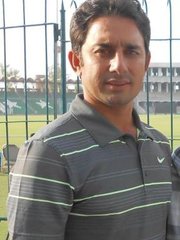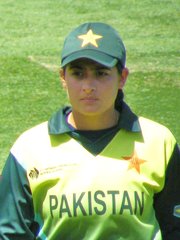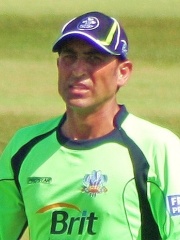
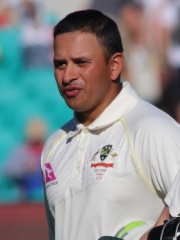


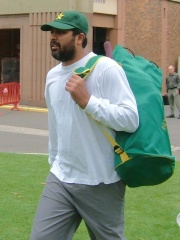
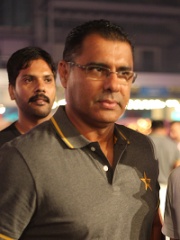
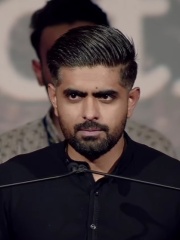

The Most Famous
CRICKETERS from Pakistan
This page contains a list of the greatest Pakistani Cricketers. The pantheon dataset contains 136 Cricketers, 21 of which were born in Pakistan. This makes Pakistan the birth place of the 4th most number of Cricketers behind Australia, and South Africa.
Top 10
The following people are considered by Pantheon to be the top 10 most legendary Pakistani Cricketers of all time. This list of famous Pakistani Cricketers is sorted by HPI (Historical Popularity Index), a metric that aggregates information on a biography's online popularity. Visit the rankings page to view the entire list of Pakistani Cricketers.

1. Younis Khan (b. 1975)
With an HPI of 42.87, Younis Khan is the most famous Pakistani Cricketer. His biography has been translated into 16 different languages on wikipedia.
Mohammad Younis Khan PP SI (Urdu: محمد یونس خان; Pashto: محمد یونس خان; born 29 November 1977) is a Pakistani professional cricket coach and former cricketer and captain of the Pakistan national cricket team in all three formats of the game, and is widely regarded as one of the greatest middle-order batsmen in Test cricket. Khan is the only Test cricketer in the history of the game to score a century in all 11 countries that have hosted Test matches. Younis Khan was a member of the Pakistan cricket team that won the 2012 Asia Cup. Under his Captaincy Pakistan won the 2009 World Twenty20. Younis holds the record for the most runs and the most centuries scored by a Pakistani in Test cricket. He is the third Pakistani player to score 300 or more runs in an innings. He is one of a handful of Test batsman in the world with a century conversion ratio of over 50 percent, with 34 centuries and 33 fifties. He led Pakistan to their victory in the 2009 ICC World Twenty20, which was their first World Twenty20 title. On 23 April 2017, he became the first Pakistani and 13th batsmen ever to score 10,000 runs in Test cricket. He became the oldest and sixth fastest batsmen to reach the 10,000 run milestone in relation to innings played. On 24 March 2010, Younis, along with teammate Mohammad Yousuf, was suspended from playing by the Pakistan Cricket Board following an inquiry report which suggested they were involved in breaches of discipline by inciting divisions within the team. The ban was lifted three months later. In a Test match against Australia beginning on 22 October 2014, Younis made his 25th and 26th centuries in the same match, becoming just the 6th Pakistani to do so. On 25 June 2015, Younis became the fifth Pakistani cricketer to play 100 Test matches and on 13 October 2015, he became Pakistan's highest run scorer in Test cricket, breaking Javed Miandad's record of 8,832 runs. Younis retired from ODI cricket in November 2015. He retired from all forms of international cricket at the conclusion of the series against the West Indies in May 2017.

2. Usman Khawaja (b. 1986)
With an HPI of 41.20, Usman Khawaja is the 2nd most famous Pakistani Cricketer. His biography has been translated into 17 different languages.
Usman Tariq Khawaja (Urdu: عثمان خواجہ; born 18 December 1986) is an Australian international cricketer who represents the Australia national cricket team in Test cricket, and captains the Brisbane Heat in the Big Bash League and plays for Queensland at domestic level. Khawaja made his first-class cricket debut for New South Wales in 2008 and played his first international match for Australia in January 2011. He played for the Sydney Thunder from 2011–2022, with whom he won the 2015–16 Big Bash League season, winning man of the match in the final, top scoring with 70 runs. He has played county cricket in the United Kingdom and briefly played in both the Indian Premier League and Pakistan Super League Twenty20 tournaments. Khawaja captained Queensland in first class cricket and from 2015–2024, captaining them to the 2020–21 Sheffield Shield title, batting No. 4. Khawaja opened the batting and scored a hundred, winning man of the match for the Queensland team that won the 2013–14 Ryobi One-Day Cup final. Khawaja played ODI cricket sporadically from 2013–2019 and only played T20I cricket for one season in 2016. He played in both the 2016 T20 World Cup and the 2019 Cricket World Cup. A left-handed batter, Khawaja has spent the majority of his international career batting at No. 3 or opening the batting. Khawaja was a member of the Australian team that won the 2021–2023 ICC World Test Championship. He was the second-highest scoring batsman in the 2021–2023 ICC World Test Championship with 1,621 runs, the highest by an Australian batsman. In 2023, he won the ICC Test Cricketer of the Year Award. Khawaja announced his retirement from international cricket on 2 January 2026 to take effect from the fifth Ashes Test at the Sydney Cricket Ground.

3. Wasim Akram (b. 1966)
With an HPI of 40.81, Wasim Akram is the 3rd most famous Pakistani Cricketer. His biography has been translated into 20 different languages.
Wasim Akram (Punjabi, Urdu: وَسیم اکرم; born 3 June 1966) is a Pakistani cricket commentator, coach, and former cricketer and captain of the Pakistan national cricket team. Akram is regarded as one of the greatest bowlers of all time. He is often revered as The Sultan of Swing. In October 2013, Wasim Akram was the only Pakistani cricketer to be named in an all-time Test World XI to mark the 150th anniversary of Wisden Cricketers' Almanack. As captain, he led Pakistan to the finals of the 1999 Cricket World Cup, where they lost to Australia by 8 wickets. He was a part of the Pakistani squad which won the 1992 Cricket World Cup. A left-arm fast bowler who could bowl with significant pace, he holds the world record for most wickets in List A cricket, with 881, and is second only to Sri Lankan off-spin bowler Muttiah Muralitharan in terms of ODI wickets, with 502 in total. He is considered to be one of the founders, and perhaps the finest exponent of, reverse swing bowling. He was the first bowler to reach the 500-wicket mark in ODI cricket, and he did so during the 2003 World Cup. In 2002, Wisden released its only list of the best players of all time. Wasim was ranked as the best bowler in ODI of all time, with a rating of 1223.5, ahead of Allan Donald, Imran Khan, Waqar Younis, Joel Garner, Glenn McGrath and Muralitharan. Wasim took 23 four-wicket hauls in 356 ODI matches played. On 30 September 2009, Akram was one of five new members inducted into the ICC Cricket Hall of Fame. He was the bowling coach of the Kolkata Knight Riders. However, he took a break from the position for IPL 6, citing a need to spend more time with family in Karachi, and he took a further break from IPL 2017; he was replaced by Lakshmipathy Balaji. He was working as director and bowling coach of Islamabad United in Pakistan Super League until he left to join Multan Sultans in August 2017. In October 2018, he was named in the Pakistan Cricket Board's seven-member advisory cricket committee. In November 2018, he joined PSL franchisee Karachi Kings as President. The Government of Pakistan awarded him the Hilal-e-Imtiaz on 23 March 2019 for his lifetime achievements in the field of cricket.

4. Shahid Afridi (b. 1980)
With an HPI of 40.80, Shahid Afridi is the 4th most famous Pakistani Cricketer. His biography has been translated into 28 different languages.
Sahibzada Mohammad Shahid Khan Afridi (Urdu: شاہد افریدی, Pashto: شاهد افریدی; born 1 March 1977) is a Pakistani former cricketer and captain of the Pakistan national cricket team. An all-rounder, Afridi was a right-handed leg spinner and a right-handed batsman. Afridi made his ODI debut in 1996 against Kenya. In his second ODI match against Sri Lanka, he played his first international innings and broke the record for fastest century in ODI cricket (doing so in 37 deliveries). He made his Test debut against Australia in 1998. Afridi made his T20I debut against England in 2006. Afridi was named player of the tournament of the 2007 T20 World Cup. Afridi was player of the match in the final of the 2009 T20 World Cup scoring an unbeaten 54 and getting figures of 1/20 off of 4 overs as Pakistan went on to win the final. Shortly after Pakistan's win at the 2009 World Cup, Pakistan's captain, Younis Khan, announced his retirement from T20Is and Afridi was appointed as his successor. In 2010, Afridi was appointed Pakistan's ODI captain after the sacking of Mohammad Yousuf. Afridi was also appointed Pakistan's Test captain but retired from the format after one match as captain. He led the Pakistan team in the 2011 Cricket World Cup where they reached the semi-finals before losing to rival India. In 2011, Afridi was removed as ODI captain. In 2015, Afridi retired from ODI cricket. After Pakistan's group stage elimination from the 2016 T20 World Cup, Afridi stepped down from captaincy. He was not selected afterwards and on 19 February 2017, Afridi announced his retirement from international cricket. He made a brief return to international cricket after being selected to represent and captain the World XI against the West Indies in the 2018 Hurricane Relief T20 Challenge charity match. Following the conclusion of the match, Afridi announced his retirement from international cricket again on 31 May 2018. He served as the interim chief selector of the Pakistan cricket team for Pakistan's series against New Zealand. Afridi runs his own charity, the Shahid Afridi Foundation which aims to provide education and healthcare facilities. He also teamed up with UNICEF to promote the anti-polio campaign in the country. During the 2019 Coronavirus pandemic, he was involved in helping people across Balochistan during the lockdown in the country. This led to him contracting COVID-19 on 13 June 2020. Afridi was also nominated among the top 20 most charitable athletes of 2015.

5. Shoaib Akhtar (b. 1975)
With an HPI of 37.83, Shoaib Akhtar is the 5th most famous Pakistani Cricketer. His biography has been translated into 17 different languages.
Shoaib Akhtar (Punjabi pronunciation: [ˈʃoeːb əxtər]; born 13 August 1975) is a Pakistani former international cricketer and commentator. Nicknamed the "Rawalpindi Express", he is one of the fastest bowlers in cricketing history. Akhtar made his Test match debut in November 1997 as an opening fast bowler and played his first One Day International three months later. Post-retirement, he began a YouTube career by starting his own channel, where he gives reviews on International and league matches and Pakistani cricket.

6. Inzamam-ul-Haq (b. 1970)
With an HPI of 36.99, Inzamam-ul-Haq is the 6th most famous Pakistani Cricketer. His biography has been translated into 16 different languages.
Syed Inzamam-ul-Haq SI (Urdu: سید انضمام الحق; born 3 March 1970), also known as Inzi, is a former Pakistan cricketer and captain of Pakistan national cricket team. He is regarded as one of the greatest players Pakistan has produced and one of the best middle-order batsmen of all time. He was the former chief selector of the Pakistan cricket team before resigning in 2023. He was a part of the Pakistani squad which won the 1992 Cricket World Cup. He was the leading run scorer for Pakistan in one-day internationals, and the third-highest run scorer for Pakistan in Test cricket. He is the only Pakistani batsman to score 20,000 runs in international cricket arena. He was the captain of the Pakistan national cricket team from 2003 to 2007. As well as being a prolific batsman, he also occasionally bowled gentle left-arm spin. Inzamam rose to fame in the semi-final of the 1992 Cricket World Cup. He remained one of the team's leading batsmen throughout the decade in both Test and ODI cricket. In 2003, he was appointed captain of the team. His tenure as captain ended after Pakistan's early exit from the 2007 Cricket World Cup. Inzamam retired from international cricket in 2007, following the second Test match against South Africa, falling three runs short of Javed Miandad as Pakistan's leading run scorer in Test cricket at the time. Following his retirement, he joined the Indian Cricket League, captaining the Hyderabad Heroes in the inaugural edition of the Twenty20 competition. In the ICL's second edition, he captained the Lahore Badshahs, a team composed entirely of Pakistani cricketers. Inzamam-ul-Haq is a prominent member of the Tablighi Jamaat, an Islamic missionary organisation, and remains an influential personality in Pakistan cricket. In April 2016, he was appointed the chief selector of the Pakistan national cricket team. In August 2023, he was again appointed chief selector of the Pakistan cricket team.

7. Waqar Younis (b. 1971)
With an HPI of 35.39, Waqar Younis is the 7th most famous Pakistani Cricketer. Her biography has been translated into 17 different languages.
Waqar Younis Maitla HI (Punjabi, Urdu: وقار یونس میتلا; born 16 November 1971) is a Pakistani cricket coach, commentator and former cricketer who captained Pakistan national cricket team. A right-arm fast bowler, he is widely regarded as one of the greatest bowlers of all time. He is the former head coach of the Pakistani cricket team. He was a part of the squad which finished as runners-up at the 1999 Cricket World Cup. As of 2021, Younis holds the record for being the youngest Pakistani Test captain and the fourth youngest Test captain in history (22 years 15 days). He played 87 Tests and 262 One Day International (ODI) matches for Pakistan during his international cricket career from 1989 to 2003. Younis' trademark was his ability to reverse swing a cricket ball at high speed. He took 373 Test wickets and 416 One Day International wickets during his career. Together with bowling partner Wasim Akram, he formed one of the world's most feared bowling attacks. Younis has the second best strike rate, after Dale Steyn, for any bowler with over 350 Test wickets. He is the youngest bowler to take 400 wickets in ODI cricket. He is also placed in the top ten of all time based on ICC rankings. He worked as a bowling coach with the national side from 2006 to 2007. Waqar was appointed the coach of the Pakistan cricket team on 3 March 2010. He resigned as Pakistan's cricket coach on 19 August 2011 citing personal reasons. He joined Sunrisers Hyderabad as their bowling coach for the Indian Premier League 2013 season. On 4 September 2019, Younis was appointed by the PCB as Pakistan's new bowling coach on a 3-year contract. He replaced Azhar Mahmood, who was sacked after Pakistan's disappointing performance in the ICC World Cup 2019 tournament.

8. Babar Azam (b. 1994)
With an HPI of 34.13, Babar Azam is the 8th most famous Pakistani Cricketer. His biography has been translated into 22 different languages.
Mohammad Babar Azam (Urdu, Punjabi: محمد بابر اعظم; pronounced [muhamməd babəɾ azəm]; born 15 October 1994) is a Pakistani international cricketer and a former captain of the Pakistan national team in all three formats of the game. A right-handed top-order batter, he captains Peshawar Zalmi in the Pakistan Super League. Azam was a member of the Pakistan team that won the 2017 ICC Champions Trophy.

9. Misbah-ul-Haq (b. 1974)
With an HPI of 33.35, Misbah-ul-Haq is the 9th most famous Pakistani Cricketer. His biography has been translated into 19 different languages.
Misbah-ul-Haq Khan Niazi PP SI (Urdu: مصباح الحق خان نیازی; born 28 May 1974) is a former Pakistani international cricketer and former cricket coach. Misbah captained Pakistan national cricket team in all formats and is former head coach and former chief selector of the national team. As captain, he led Pakistan to being the champions of the 2012 Asia Cup. Misbah was a member of the team that won the 2009 ICC World Twenty20, two years after the defeat from the final in the previous tournament. A late bloomer, Misbah was a middle-order batsman best known for his composure with the bat whilst also having the ability to be an aggressive big shot player when required. Misbah scored the fastest fifty in Test cricket and set a new record for the fastest Test hundred and holds the record for most career ODI runs without a century. Misbah has an MBA degree in Human Resource Management from the University of Management and Technology in Lahore, Punjab. After announcing retirement from limited overs cricket in 2015, Misbah continued to play Test cricket for a few years. On 4 April 2017, Misbah announced his retirement from all international cricket as well after the conclusion of West Indies tour. Misbah retired from all formats of international cricket on 14 May 2017.

10. Shoaib Malik (b. 1982)
With an HPI of 32.04, Shoaib Malik is the 10th most famous Pakistani Cricketer. His biography has been translated into 17 different languages.
Shoaib Malik (Punjabi, Urdu: شعیب ملک; pronounced [ʃoeːb məlɪk]; born 1 February 1982) is a Pakistani cricketer who played for the Pakistan national cricket team and currently plays for Quetta Gladiators in the Pakistan Super League (PSL). He was the captain of the Pakistan national cricket team from 2007 to 2009. He made his One Day International debut in 1999 against the West Indies and his Test debut in 2001 against Bangladesh. With his country, he won the 2009 World Twenty20 and the 2017 ICC Champions Trophy.
People
Pantheon has 21 people classified as Pakistani cricketers born between 1966 and 2000. Of these 21, 21 (100.00%) of them are still alive today. The most famous living Pakistani cricketers include Younis Khan, Usman Khawaja, and Wasim Akram. As of April 2024, 8 new Pakistani cricketers have been added to Pantheon including Saeed Ajmal, Mohammad Rizwan, and Shaheen Afridi.
Living Pakistani Cricketers
Go to all RankingsYounis Khan
1975 - Present
HPI: 42.87
Usman Khawaja
1986 - Present
HPI: 41.20
Wasim Akram
1966 - Present
HPI: 40.81
Shahid Afridi
1980 - Present
HPI: 40.80
Shoaib Akhtar
1975 - Present
HPI: 37.83
Inzamam-ul-Haq
1970 - Present
HPI: 36.99
Waqar Younis
1971 - Present
HPI: 35.39
Babar Azam
1994 - Present
HPI: 34.13
Misbah-ul-Haq
1974 - Present
HPI: 33.35
Shoaib Malik
1982 - Present
HPI: 32.04
Saeed Ajmal
1977 - Present
HPI: 30.12
Imran Tahir
1979 - Present
HPI: 30.08
Newly Added Pakistani Cricketers (2025)
Go to all RankingsSaeed Ajmal
1977 - Present
HPI: 30.12
Mohammad Rizwan
1992 - Present
HPI: 26.46
Shaheen Afridi
2000 - Present
HPI: 26.33
Sana Mir
1986 - Present
HPI: 25.08
Nida Dar
1987 - Present
HPI: 23.25
Umar Akmal
1990 - Present
HPI: 23.12
Ahmed Shehzad
1991 - Present
HPI: 23.11
Bismah Maroof
1991 - Present
HPI: 21.72

